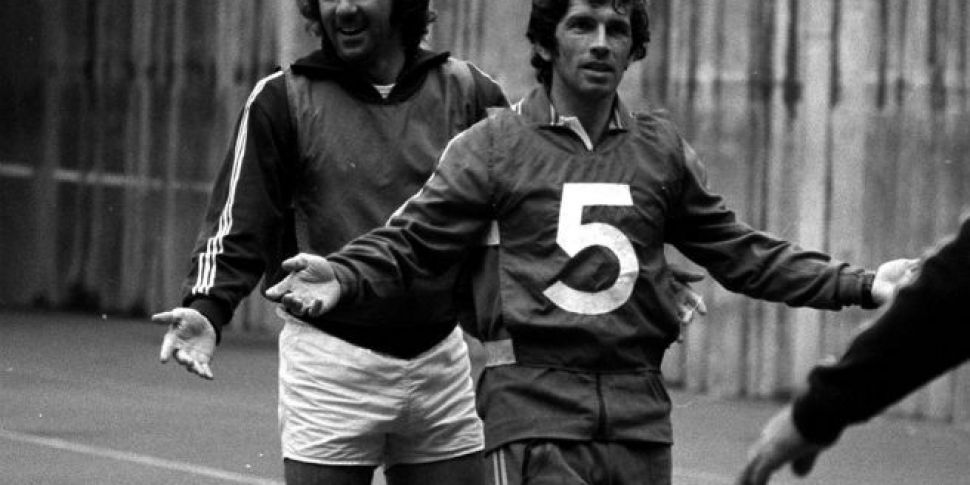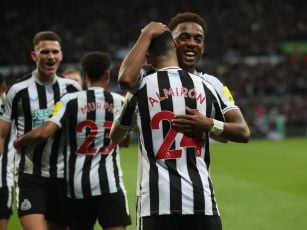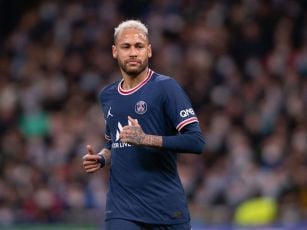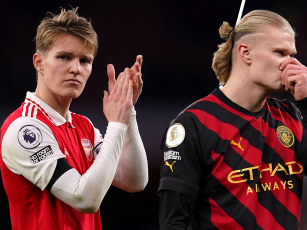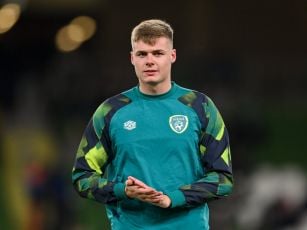"As it happens, I can't recall who got injured, but somebody got injured and because he was there at Crystal Palace and it was handy he was brought on the trip. So, he was called up to the squad. So it's all bluff and bluster. As it has been, because I know Eamon since he was 12 years of age, and he's always been like that. I just said to him, 'you're coming now, so much for your beliefs.'"
That is the culmination of ex-Ireland, Chelsea and West Brom full-back Paddy Mulligan's story on this week's Team 33 as he discussed the controversy surrounding Ireland's tour to South America in 1974.
He spoke to us about the dream trip to Brazil's Maracana which not only kicked off the tour but also happened to be just new Ireland player-manager John Giles' second game in charge, before telling us about the second tour match against Uruguay, where the Irish team - with hindsight - were in fact at most risk from "Al Capone" type organised crime figures.
But the controversy from the '74 tour has always surrounded the third and final leg of the week long trip in May of that year.
Chile was the destination and it was coming just months after the Chilean military led by Augusto Pinochet engineered a right wing coup - backed by the CIA as they often did during the Cold War - which toppled the left-wing regime of president Salvador Allende, who perished in La Moneda palace - reportedly by his own hand though.

A man holds a photograph of Chile's late President Salvador Allende outside La Moneda presidential palace in Santiago, Chile, Wednesday, Sept. 11, 2013. Chile is marking the 40th anniversary of the military coup by Gen. Augusto Pinochet that overthrew Allende on Sept. 11, 1973. (AP Photo/Luis Hidalgo)
The weeks and months that followed that 1973 coup saw the torture, murder and forced disappearances of left-wing activists and opposition figures with Chile's Estadio Nacional stadium in Santiago a particular grisly vacuum for human rights.
As it happened, Ireland would be the first international side to take on Chile after the coup and then-Irish international Eamon Dunphy, who had not been included in the original squad for the game, had been opposed to the fixture taking place.
Paddy expands on that in the podcast.
Listen to the full interview with Paddy Mulligan on the tour and much more just below or stream for free on iTunes:
But two years before the controversial Chile match - which we won 2-1 - Ireland had its first taste of what it was like to take part in something resembling a World Cup.
For those of us, who can only remember the post-Euro 88 and Italia 90 landscape, the Boys in Green were absentees at major international tournaments, although as Paddy explains on the podcast, we were "robbed" in the qualifiers for World Cup 1978.
But in the summer of 1972, Ireland was invited to a tournament called the Brazil Independence Cup which was celebrating the 150th anniversary of the South American nation's independence from Portugal, and that's what I want to look back on in this week's The World Is A Football.
Paddy, who you can listen to reviewing the Premier League action, every Monday on Newstalk's Rewind podcast was part of that tour, which he describes as a "mini World Cup" and got to face some of the world's best sides who were pitched into three groups.
Group A saw Argentina, France, an all-Africa selection, Colombia and a CONCACAF (North and Central America) representative team go head-to-head, while C pitched Yugoslavia into a group featuring all-South American opposition in Paraguay, Peru, Bolivia and Venezuela.
Ireland ended up in Group B with an eclectic mix of sides including a Portugal featuring the late, great football legend Eusebio (and another less well-known player who we'll discuss shortly), Iran and Ecuador.
Unfortunately, then-Irish manager Liam Tuohy had to contend with a pre-tournament blow as John Giles was forced out through injury.
As Paddy told Joe Coffey, Derek Ryan and I on the show, "we were very sadly depleted because a lot of our top players couldn't make it for one reason or another. With injuries, the likes of John Giles had a back problem."
The first game against Iran did not start off well either as a Parviz Ghelichkhani goal within 10 minutes put Ireland 1-0 down in Recife.

Paddy in 2006 (Picture by: Henry Browne / EMPICS Sport)
Fortunately, we fought back though as second half goals from Mick Leech and Don Givens turned the tide to help Ireland open their Independence Cup with a 2-1 victory.
After the June 11th game, Ireland had a week to soak in the Brazilian atmosphere around them before taking the trip to Natal which wasn't a million miles away from Recife.
There, they held their own again, this time making a far better start than against Iran. Eamonn Rogers, who played for Charlton Athletic at the time, scored after two minutes to get the ball rolling in a 3-2 victory, with Mick Martin and the League of Ireland-based Turlough O'Connor scoring the other two.
So two wins from two had Ireland in a good position but that's as good as it got as they returned to Recife for the two final group games.
Chile, in the final year of the pre-coup era, beat us 2-1 with Carlos Caszely scoring their opener.
Last year, I saw an Al Jazeera documentary series about footballers who played a political and social role and Caszely featured in one episode where he spoke about his left-wing views and how he survived the repression which followed the '73 coup. It's well worth a watch and that series, presented by Eric Cantona, also features Didier Drogba and Brazil great Socrates' role in Corinthians democracy:
Ireland did have one more game to try and either finish top or nab a best runner-up spot in Group B.
However, Eusebio's Portugal who was "having a nightmare at the time" according to Paddy, stood in the way and beat us in a mad three minute spell.
Fernando Peres put them in front on 35 minutes, before Nene added a second two minutes.
But then Leech pulled one back for Ireland just a minute later as Ireland lost the game and settled for third in Group B.
And that's not all, as Paddy revealed.
"When we played Portugal, who do you think came on as a sub in the second half of the game? I only discovered this a few weeks back from Mick Leech. Mourinho's father was the goalkeeper and he came in for 45 minutes and I think that was his one and only cap!"
As Ireland returned home, Portugal would go on to face their former colony Brazil in the final at the Maracana but ended up losing to a goal from 1970 Golden Boot winner Jairzinho.
But from an Irish perspective, "it was a magnificent tournament for three weeks out there" as Paddy says and a precursor to the heady away trips in the Big Jack era.
You can read more from Raf's The World Is A Ball series every Wednesday on Newstalk.com. To find past articles, head to the Team 33 show page.
Paddy will also be back on Newstalk's Rewind podcast next Monday afternoon to review the weekend action with Oisin Langan and Raf Diallo.
Download the brand new OffTheBall App in the Play Store & App Store right now! We've got you covered!
Subscribe to OffTheBall's YouTube channel for more videos, like us on Facebook or follow us on Twitter for the latest sporting news and content.

